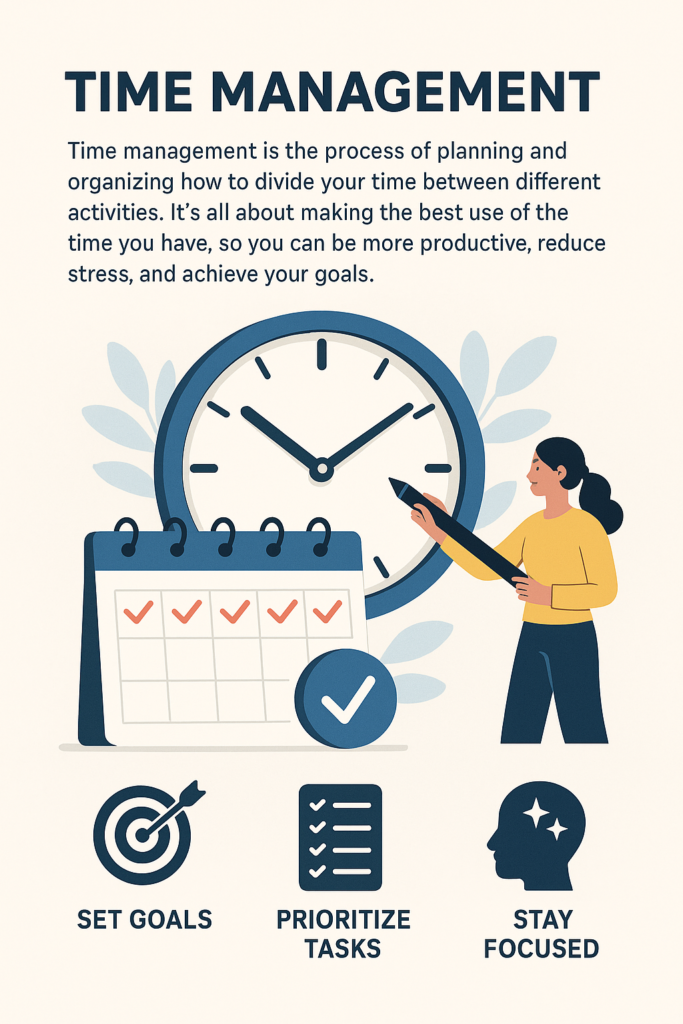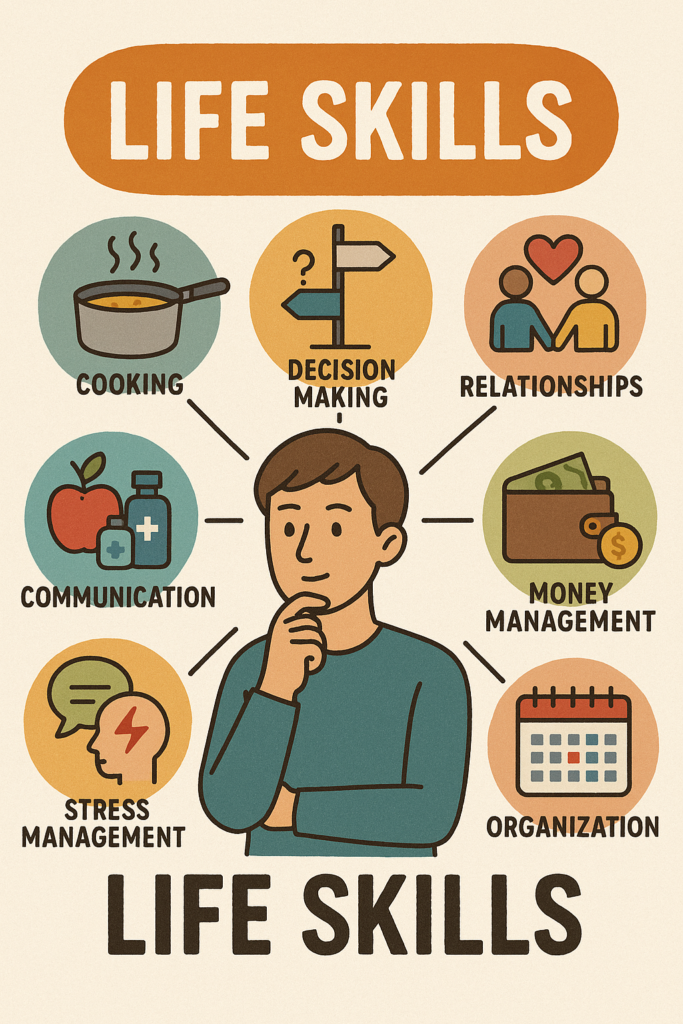The Importance of Time Management: A Simple Guide
Time management is the process of planning and organizing how to divide your time between different activities. It’s all about making the best use of the time you have, so you can be more productive, reduce stress, and achieve your goals.

Why Time Management is Important
1. Helps You Stay Organized
Time management helps you stay organized by making sure that you know what tasks to complete and when. This means you won’t forget important things or end up rushing at the last minute.
- Example: If you have school assignments, hobbies, and personal activities, time management ensures that you know when to focus on each one, instead of scrambling to finish everything at once.
2. Increases Productivity
When you manage your time well, you can get more things done in less time. You’re not wasting time thinking about what to do next or getting distracted. Instead, you focus on completing the task at hand efficiently.
- Example: Instead of spending hours on social media, you can use that time to study, work, or practice a skill. By prioritizing your tasks, you can achieve more in a shorter amount of time.
3. Reduces Stress
Good time management can reduce stress by helping you stay on top of your responsibilities. You won’t have to worry about deadlines or last-minute rushes. When you plan your time well, you know what to expect and can avoid feeling overwhelmed.
- Example: If you have a test coming up, you can break down your study schedule over a week, instead of trying to cram everything the night before.
4. Helps You Achieve Your Goals
When you manage your time properly, you can focus on what really matters to you—whether it’s studying for exams, working on a project, or spending time with family and friends. By organizing your time, you can break big tasks into smaller steps and make steady progress toward achieving your goals.
- Example: If your goal is to get fit, time management allows you to plan workouts, meal prepping, and enough rest so that you can reach your fitness goals without feeling like you’re sacrificing everything else.
5. Improves Decision-Making
Time management helps you make better decisions because you have a clear understanding of what’s important and what’s not. When you’re organized, you can prioritize tasks and focus on the ones that have the most value or urgency.
- Example: Instead of spending hours on activities that don’t help you achieve your main goals, you’ll know when to focus on things that move you forward.
6. Increases Focus and Concentration
When you manage your time well, you know exactly when you need to be focused and when to take breaks. By sticking to a schedule, you can eliminate distractions and improve your ability to concentrate.
- Example: If you’re working on a project or studying, you can block out distractions like your phone or social media for a set period of time. This way, you can give your full attention to the task and complete it faster and better.
7. Gives You More Free Time
Effective time management means that you can complete your tasks faster and more efficiently. This can actually give you more free time for the things you enjoy, like hanging out with friends, pursuing hobbies, or simply relaxing.
- Example: By managing your study or work hours well, you can finish earlier and have more time for yourself in the evenings or on weekends.
How to Manage Your Time Effectively
Now that you understand why time management is important, let’s look at some simple ways you can manage your time better:
1. Set Clear Goals
Know what you want to achieve in the short-term and long-term. Set realistic goals and break them down into smaller, manageable tasks.
- Example: If you want to get better at writing, set a goal to write 500 words a day and gradually increase your target.
2. Make a To-Do List
Create a list of tasks that need to be done. Write down what you need to do and when it should be completed. A list helps you stay focused and track your progress.
- Example: If you have homework, chores, and a project, write each task on a list and check them off as you finish.
3. Prioritize Tasks
Not all tasks are equally important. Prioritize the most urgent or important tasks first. This way, you make sure you’re working on what matters the most.
- Example: If you have an assignment due tomorrow, prioritize it over other tasks that have later deadlines.
4. Break Big Tasks into Smaller Steps
Large tasks can be overwhelming. Break them down into smaller steps and tackle each part one by one.
- Example: If you need to write a 10-page essay, break it down into smaller tasks like research, outlining, writing the introduction, and so on. This makes the work seem more manageable.
5. Avoid Multitasking
Multitasking can reduce the quality of your work and make you feel scattered. Instead, focus on one task at a time, complete it, and then move on to the next.
- Example: Focus on finishing your homework before checking your phone or social media. This helps you stay concentrated and finish faster.
6. Use a Calendar or Planner
Keep track of your appointments, deadlines, and important events. A calendar or planner can help you stay organized and remind you of important dates.
- Example: You can use a physical planner or apps like Google Calendar to schedule your tasks and events.
7. Take Breaks
It’s important to rest and recharge. Taking short breaks between tasks helps you stay fresh and focused.
- Example: Work for 25 minutes, then take a 5-minute break. This method, called the Pomodoro Technique, helps improve concentration and productivity.
8. Learn to Say No
Sometimes, saying yes to everything can overwhelm your schedule. Learn to say no when you have too much on your plate, and focus on the tasks that align with your goals.
- Example: If a friend invites you to hang out, but you have a project due tomorrow, it’s okay to say no and focus on your work first.
Conclusion
Time management is essential for staying organized, reducing stress, increasing productivity, and achieving your goals. By using simple strategies like setting goals, prioritizing tasks, and staying focused, you can make better use of your time. With good time management, you’ll not only get more done but also have more time for the things you enjoy.







